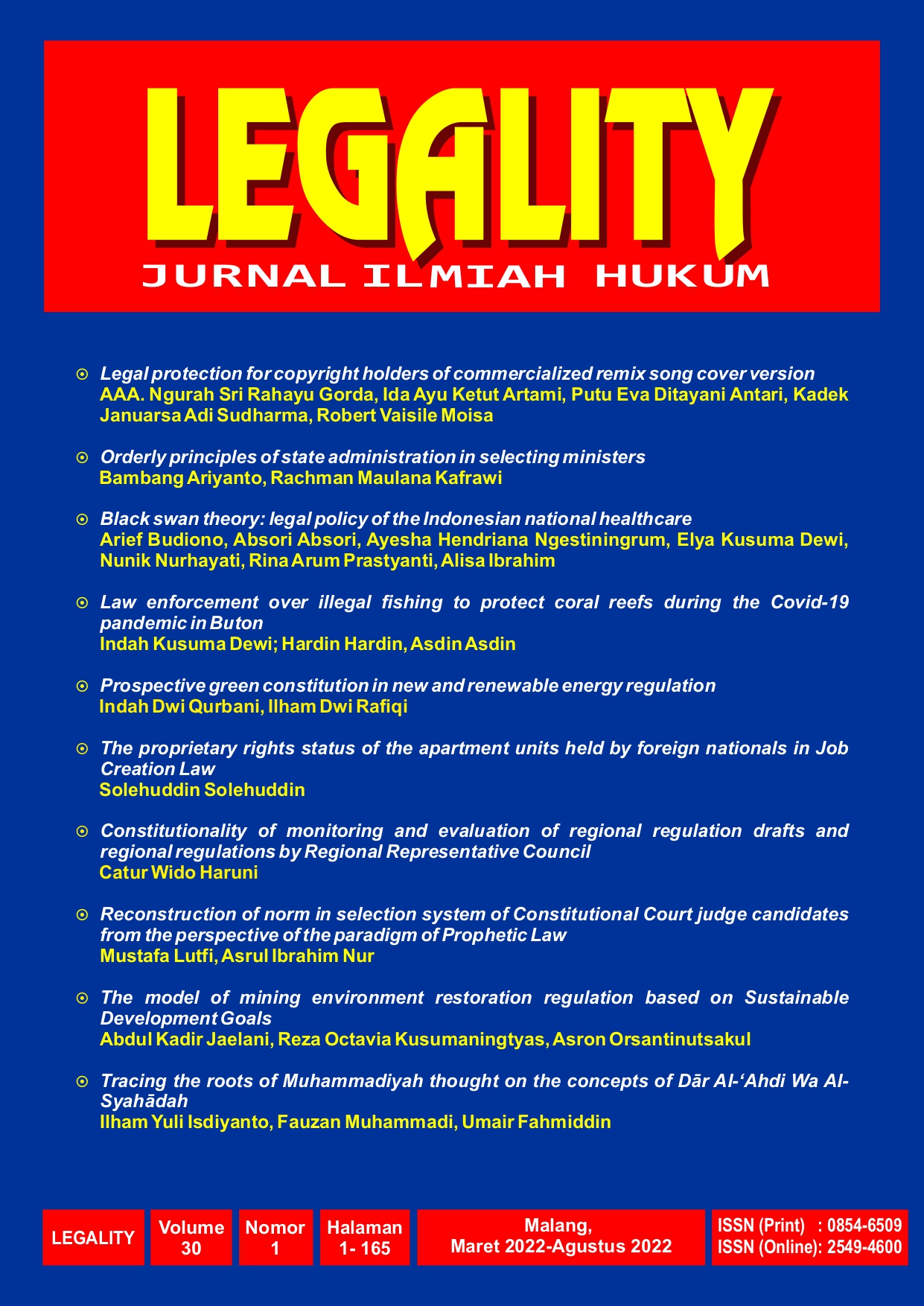Reconstruction of norm in selection system of Constitutional Court judge candidates from the perspective of the paradigm of Prophetic Law
DOI:
https://doi.org/10.22219/ljih.v30i1.20744Abstract
This article aimed to discuss the selection system of Constitutional Court Judges in Indonesia. The standardization of the recruitment system in the selection of candidates for Constitutional Court judges performed by DPR, the President, and the MA has varied due to multi-interpretations of the provisions of Article 20 (1) & (2) of Constitutional Court Law, contrary to the fact that the Third Amendment to Constitutional Court Law sets forth the mandate to selection committees. The model of the recruitment system has not been constitutionally optimal, while the process mechanism should meet transparency (involving public knowledge), participation (getting the public involved in every process), objectivity (competency-based), and accountability. However, several recruitment practices have overlooked those principles, urging further evaluation of the recruitment to take place comprehensively. One gate system in the recruitment with the assistance of the selection committees seems to be inevitable and simultaneously serves as the solution to reconstruct the system into a more standardized one in the time to come. Moreover, the selection committees must be true statesmen since they hold the authority to verify and select other statesmen as the candidates for the recruitment. The involvement of credible, professional, objective, transparent, and participative selection committees is expected to help achieve legal objectives and intent as wished by the constitution and to bring about the spirit of the prophetic law that serves as the core of the subject matter.
Downloads
References
Al-Fatih, S. (2018). Model Pengujian Peraturan Perundang-Undangan Satu Atap Melalui Mahkamah Konstitusi. Jurnal Ilmiah Hukum LEGALITY, 25(2), 247. https://doi.org/10.22219/jihl.v25i2.6005
Asyikin, N. (2020). Legal Politics of Bureaucratic Reform in Really Good Governance According to Prophetical Law. Legality : Jurnal Ilmiah Hukum, 28(1), 81–95. https://doi.org/10.22219/ljih.v28i1.10393
Bahrudin, F. A. (2020). Peran Mata Kuliah Pendidikan Pancasila Sebagai Mata Kuliah Wajib Umum dalam Mengembangkan Kepribadian Mahasiswa yang Sesuai dengan Nilai-Nilai Pancasila. Pro Patria Jurnal Pendidikan, Kewarganegaraan, Hukum, Sosial Dan Politik, 3(1), 49–66. https://doi.org/10.47080/propatria.v3i1.776
Barus, S. I. (2017). Proses Perubahan Mendasar Konstitusi Indonesia Pra dan Pasca Amandemen. Ubelaj: Universiti of Bengkulu Law Journal, 2(1), 29–55. https://doi.org/10.33369/ubelaj.2.1.29-55
Basuki, U. (2011). Struktur Ketatanegaraan: Analisis Yuridis atas Dinamika Lembaga-lembaga Negara Pasca Amandemen UUD 1945. In Right: Jurnal Agama Dan Hak Azazi Manusia, 1(1), 87–114. https://doi.org/10.14421/inright.v1i1.1213
Dewi, E. R., & Dkk. (2020). Konsep Kepemimpinan Profetik. Al-Muaddib :Jurnal Ilmu-Ilmu Sosial Dan Keislaman, 5(1), 147–159. http://dx.doi.org/10.31604/muaddib.v5i1.147-159
Fajriyah, M. (2015). Refraksi & Alinasi Pengangkatan Hakim Konstitusi. Jurnal Konstitusi, 12(2), 237–263. https://doi.org/10.31078/jk1223
Fitriana, M. K. (2015). Laws and Regulations in Indonesia as The Means of Realizing The Country’s Goal. Journal Legislasi Indonesia, 12(2), 1–27. https://doi.org/10.54629/jli.v12i2.403
Gustama, B., Al-Fatih, S., & Sarita. (2022). The Influence of TAP MPR’s Position on The Hierarchy System of Indonesian Laws and Regulations. Indonesia Law Reform Journal (ILREJ), 2(1), 67–81. https://doi.org/10.22219/ilrej.v2i1.19442
Hardianto, D. (2014). Hakim Konstitusi adalah Hati dalam Tubuh Mahkamah Konstitusi. Jurnal Konstitusi, 11(2), 315–332. https://doi.org/10.31078/jk%25x
Harijanti, S. D. (2014). Pengisian Jabatan Hakim: Kebutuhan Reformasi dan Pengekangan Diri. Jurnal Hukum Ius Quia Iustum, 21(4), 531–558. https://doi.org/10.20885/iustum.vol21.iss4.art2
Hutchinson, T., & Duncan, N. J. (2012). Defining and Describing What We Do: Doctrinal Legal Research. Deakin Law Review, 17(1), 83–119. https://doi.org/10.21153/dlr2012vol17no1art70
I Dewa Gede At. (2017). Menyoal Filsasat Ilmu Hukum. Jurnal Notariil, 2(2), 118–126. https://doi.org/10.22225/jn.2.2.348.118-126
Indramayu, Jayus, & Indrayati, R. (2017). Rekonseptualisasi Seleksi Hakim Konstitusi Sebagai Upaya Mewujudkan Hakim Konstitusi yang Berkualifikasi. Lentera Hukum, 4(1), 1–18. https://doi.org/10.19184/ejlh.v4i1.5267
Langbroek, P., Bos, K. van den, Thomas, M. S., Milo, M., & Rossum, W. van. (2017). Methodology of Legal Research: Challenges and Opportunities. Utrech Law Review, 13(3), 1–8. https://doi.org/10.18352/ulr.411
Lay, C., & Savirani, A. (2000). Reformasi Konstitusi Dalam Transisi Menuju Demokrasi. JSP: Jurnal Ilmu Sosial Dan Ilmu Politik, 4(1), 17–32. https://doi.org/10.22146/jsp.11123
Malian, S. (2010). Ilmu Hukum Profetik : Gagasan awal landasan Kefilsafatan Dan Kemungkinan pengembangannya Di Era Postmodern. UNISIA: Jurnal Ilmu-Ilmu Sosial, 33(73), 63–71. https://doi.org/10.20885/unisia.vol33.iss73.art5
Marzuki, M. L. (2010). Konstitusi dan Konstitusionalisme. Jurnal Konstitusi, 7(4), 1–8. https://doi.org/10.31078/jk%25x
Ni’matul Huda. (2013). Problematika Substantif Perppu Nomor 1 Tahun 2013 Tentang Mahkamah Konstitusi. Jurnal Konstitusi, 10(4). https://doi.org/10.31078/jk%25x
Priyanto, A. (2005). Citra hakim dan penegakan hukum dalam sistem peradilan pidana di Indonesia. Jurnal Civics, 2(2), 1–10. https://doi.org/10.21831/civics.v2i2.4374
Rishan, I. (2019). Pelaksanaan Kebijakan Reformasi Peradilan Terhadap Pengelolaan Jabatan Hakim Setelah Perubahan Undang Undang Dasar 1945. Jurnal Hukum Ius Quia Iustum, 26(2), 259–281. https://doi.org/10.20885/iustum.vol26.iss2.art3
Simamora, J. (2016). Problematika Penyelesaian Sengketa Kewenangan Lembaga Negara oleh Mahkamah Konstitusi. Mimbar Hukum - Fakultas Hukum Universitas Gadjah Mada, 28(1), 78–90. https://doi.org/10.22146/jmh.15859
Solechan. (2019). Asas-Asas Umum Pemerintahan yang Baik dalam Pelayanan Publik. Administrative Law & Governance (ALGJ), 2(3), 541–557. https://doi.org/10.14710/alj.v2i3.541-557
Sumirat, I. R. (2020). Penegakan Hukum dan Keadilan dalam Bingkai Moralitas. Al Qisthas: Jurnal Hukum Dan Politik, 11(2), 86–100. http://dx.doi.org/10.37035/alqisthas.v11i2.3827
Tan, D. (2021). Metode Penelitian Hukum: Mengupas dan Mengulas Metodologi dalam Menyelenggarakan Penelitian Hukum. Nusantara: Jurnal Ilmu Pengetahuan Sosial, 8(8), 2463–2478. http://dx.doi.org/10.31604/jips.v8i8.2021.2463-2478
Wantu, F., Nggilu, N. M., Imran, S., & Gobel, R. T. S. (2021). Proses Seleksi Hakim Konstitusi: Problematika dan Model Ke Depan. Jurnal Konstitusi, 18(2), 240–262. https://doi.org/10.31078/jk1820
Wijayanti, W., M, N. Q., & R, S. P. (2015). Transparansi dan Partisipasi Publik dalam Rekrutmen Calon Hakim Konstitusi. Jurnal Konstitusi, 12(4), 663–690. https://doi.org/10.31078/jk1241
Downloads
Published
How to Cite
Issue
Section
License
Copyright (c) 2022 Mustafa Lutfi, Asrul Ibrahim Nur

This work is licensed under a Creative Commons Attribution-ShareAlike 4.0 International License.










